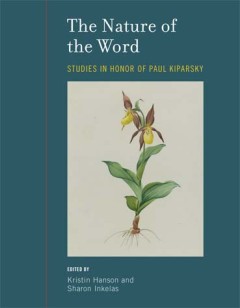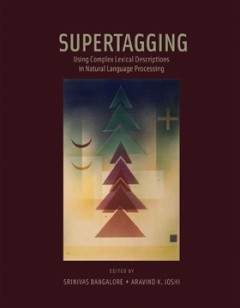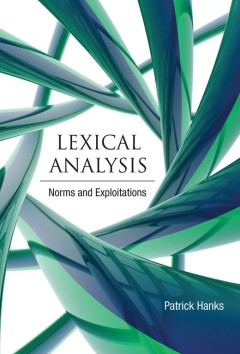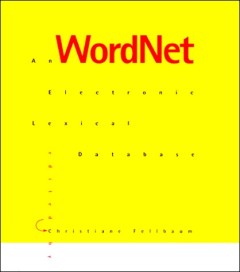Filter by

The Nature of the Word: Studies in Honor of Paul Kiparsky
Paul Kiparksy's work in linguistics has been wide-ranging and fundamental. His contributions have influenced virtually every field of contemporary linguistics, from generative phonology to poetic theory. This is a collection of essays by his colleagues and students.OCLC-licensed vendor bibliographic record.
- Edition
- -
- ISBN/ISSN
- 9780262274890
- Collation
- 1 online resource (xvi, 750 pages) :illustrations.
- Series Title
- -
- Call Number
- -

Supertagging :using complex lexical descriptions in natural language processing
The last decade has seen computational implementations of large hand-crafted natural language grammars in formal frameworks such as Tree-Adjoining Grammar (TAG), Combinatory Categorical Grammar (CCG), Head-driven Phrase Structure Grammar (HPSG), and Lexical Functional Grammar (LFG). Grammars in these frameworks typically associate linguistically motivated rich descriptions (Supertags) with word…
- Edition
- -
- ISBN/ISSN
- 9780262312486
- Collation
- 1 online resource (xxiii, 488 pages :illustrations)
- Series Title
- -
- Call Number
- -

Lexical analysis :norms and exploitations
This study offers a wide-ranging empirical investigation of word use and meaning in language. It fills the need for a lexically based, corpus-driven theoretical approach that will help people understand how words go together in collocational patterns and constructions to make meanings. Such an approach is now possible, the book argues, because of the availability of new forms of evidence (corpo…
- Edition
- -
- ISBN/ISSN
- 9780262312851
- Collation
- 1 online resource
- Series Title
- -
- Call Number
- -
Weaving A Lexicon
"A Bradford Book."The studies in Weaving a Lexicon make a significant contribution to the growing field of lexical acquisition by considering the multidimensional way in which infants and children acquire the lexicon of their native language. They examine the many strands of knowledge and skill--including perceptual sensitivities, conceptual and semantic constraints, and communicative intent--t…
- Edition
- -
- ISBN/ISSN
- 9780262274777
- Collation
- 1 online resource (xvii, 648 pages) :illustrations
- Series Title
- -
- Call Number
- -

WordNet :an electronic lexical database
"Contributors : Reem Al-Halimi, Robert C. Berwick, J.F.M. Burg, Martin Chodorow, Christiane Fellbaum, Joachim Grabowski, Sanda Harabagiu, Marti A. Hearst, Graeme Hirst, Douglas A. Jones, Rick Kazman, Karen T. Kohl, Shari Landes, Claudia Leacock, George A. Miller, Katherine J. Miller, Dan Moldovan, Naoyuki Nomura, Uta Priss, Philip Resnik, David St-Onge, Randee Tengi, Reind P. van de Riet, Ellen…
- Edition
- -
- ISBN/ISSN
- 9780262272551
- Collation
- 1 online resource (xxii, 423 pages).
- Series Title
- -
- Call Number
- -

Machine translation :a view from the lexicon
"Bonnie Jean Dorr is Assistant Professor in the Computer Science Department at the University of Maryland.""This book describes a novel, cross-linguistic approach to machine translation that solves certain classes of syntactic and lexical divergences by means of a lexical conceptual structure that can be composed and decomposed in language-specific ways. This approach allows the translator to o…
- Edition
- -
- ISBN/ISSN
- 0262290839
- Collation
- 1 online resource (xx, 432 pages) :illustrations.
- Series Title
- -
- Call Number
- -

Lexical representation and process
Outgrowth of a conference held in Nijmegen, the Netherlands under the joint sponsorship of the Max-Planck-Institut f?ur Psycholinguistik and the Interfacultaire Werkgroep Taal en Spraakgedrag of the University of Nijmegen."A Bradford book."OCLC-licensed vendor bibliographic record.
- Edition
- -
- ISBN/ISSN
- 9780262279178
- Collation
- 1 online resource (x, 576 pages) :illustrations
- Series Title
- -
- Call Number
- -
 Computer Science, Information & General Works
Computer Science, Information & General Works  Philosophy & Psychology
Philosophy & Psychology  Religion
Religion  Social Sciences
Social Sciences  Language
Language  Pure Science
Pure Science  Applied Sciences
Applied Sciences  Art & Recreation
Art & Recreation  Literature
Literature  History & Geography
History & Geography